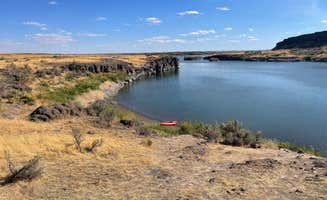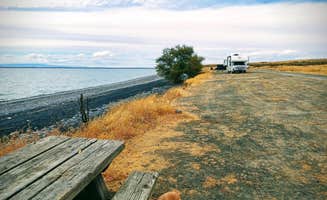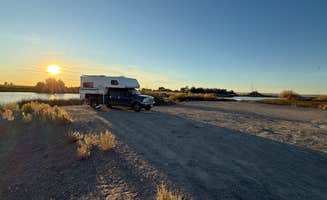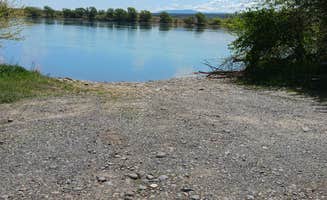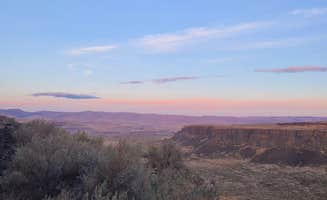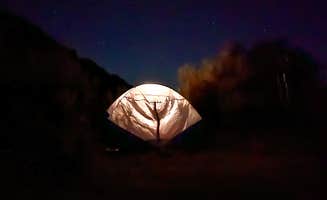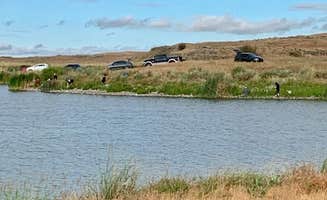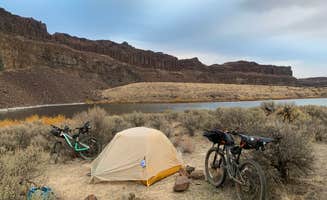Dispersed camping near Warden, Washington centers primarily around the Columbia Basin Wildlife Area, a desert landscape with shrub-steppe terrain at approximately 1,060 feet elevation. The region experiences hot, dry summers with temperatures frequently exceeding 90°F between June and August, and cold winters with occasional snow. Most primitive sites sit on open terrain with minimal natural shade, creating challenging conditions during peak summer heat.
What to do
Fishing opportunities: At Martha Lake Dispersed Camping, anglers can access well-stocked waters directly from camp. "There were a few daytime use out fishing. We spent the evening listening to a variety of birds before the frogs sang us to sleep," reports a camper who found this location "quiet and peaceful" for an overnight stay.
Wildlife viewing: Trail Lake Dispersed offers excellent bird watching opportunities alongside water recreation. One visitor noted, "Since there were lots of bugs there were also lots of birds to watch," while another mentioned it's "great for swimming fishing kayaking paddle boarding."
Rock climbing: For those seeking more active recreation, the area's basalt formations provide climbing opportunities. At Frenchman Coulee Dispersed Camping, "Lots of people rock climbing, tall waterfall across the valley. Very quiet. Can hear birds fly by." The site features natural basalt columns and established climbing routes.
What campers like
Lake access: At many dispersed sites, waterfront camping allows direct access for recreation. At Trail Lake, a camper described "Different pull outs felt secluded enough," while another noted that "The lake is large and a beautiful clear blue."
Privacy between sites: Many campers value the separation between sites. At Long Lake, visitors appreciate being spread out: "Very private and spread out. There's a handful of sites, each with make shift fire pits and none super close to each other."
Stargazing opportunities: Clear skies and minimal light pollution create excellent stargazing conditions. One Frenchman Coulee camper noted, "On clear nights you can see all the stars. Which is my favorite!" The open terrain throughout the region provides unobstructed views of the night sky.
What you should know
Insect population: Mosquitoes and other insects can be problematic, especially near water. One Trail Lake visitor reported, "But literally the most mosquitos I've ever seen (and I used to work in the woods of northern Maine). My family can deal with basically any conditions and we bailed to drive into the night after 30 minutes of painful tent setup."
Permit requirements: Most public land camping requires a Washington Discover Pass. At Perch Point Wild Camping Area, "This is state property and a Discover Pass is required to stay here ($10/day or $30/year). Rangers did come by and check our pass and look at our license plate."
Road conditions: Access roads to many sites can be challenging. A Martha Lake camper noted it's "Right off the interstate and easy for any size rig to get in," while Frenchman Coulee requires "Best to have high clearance as there are some good size rock outcroppings."
Weather considerations: The region can experience extreme conditions. At Perch Point, "Flies and bees were annoying, but manageable. Same with the wind, not too bad." Wind exposure is common due to the open terrain at many sites.
Tips for camping with families
Location selection: Choose sites with amenities appropriate for children. A Trail Lake visitor advises, "The water is nice and cool. Good for cooling down on a hot day," making it suitable for family swimming.
Safety concerns: Rocky terrain at some sites requires caution. At Frenchman Coulee, "The actual camping, it's kind of a chore to set up tents just because the ground is so rocky. But if you have a good mallet and sharp tent steaks as well as some patients you'll be fine."
Noise factors: Road proximity can affect sleep quality. At Trail Lake, "There is a noise factor to deal with though there are some roads nearby so you do hear cars throughout the night."
Wildlife awareness: Cattle grazing occurs in some areas. "During some months their is cattle in the area and they come down to the lake in the morning and greet you," notes a Long Lake camper.
Tips from RVers
Level parking: Finding level ground is important for comfortable RV camping. A Martha Lake visitor reported, "Camping areas are big gravel lots next to the lake. Had no problem with level."
Accessibility: Some sites accommodate larger vehicles better than others. At Vernita Bridge, "If you need a quiet place for one night or are hauling a river fishing boat, this is a good place to stay," though another noted it's "Not for regular camping. Used for staying overnight and getting up early to hit the water."
Service availability: Cell reception varies but is generally available. A Perch Point camper noted, "Good cell reception for Verizon and ATT," which is helpful for RVers requiring connectivity.
Overnight convenience: Several sites work well as transit stops. One Martha Lake visitor shared, "Great overnight stop with a lake view out our back door," making it particularly useful for travelers passing through the area.


